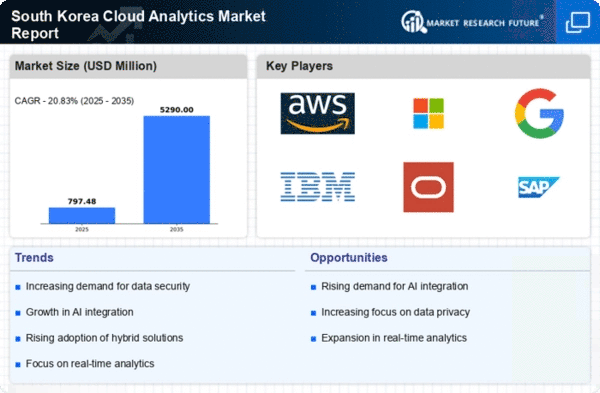Expansion of Cloud Infrastructure
The cloud analytics market benefits significantly from the ongoing expansion of cloud infrastructure in South Korea. With major investments in data centers and cloud services, companies are increasingly adopting cloud-based solutions to enhance their analytics capabilities. The South Korean government has also been promoting initiatives to bolster the digital economy, which includes the development of robust cloud infrastructure. This environment fosters a conducive atmosphere for the growth of the cloud analytics market. As organizations migrate to the cloud, they gain access to scalable resources and advanced analytics tools, which are crucial for processing large datasets. The cloud analytics market is thus likely to see accelerated growth as infrastructure improvements continue to support the increasing demand for data analytics.
Integration of Advanced Technologies
The integration of advanced technologies such as IoT and big data analytics is driving the cloud analytics market in South Korea. As businesses adopt IoT devices, they generate vast amounts of data that require sophisticated analytics to derive actionable insights. The cloud analytics market is adapting to this trend by offering solutions that can seamlessly integrate with IoT systems, enabling real-time data processing and analysis. This integration not only enhances operational efficiency but also supports predictive analytics, which is becoming increasingly important for businesses aiming to anticipate market trends. The potential for growth in this sector is substantial, as organizations seek to harness the power of interconnected devices and data streams.
Increased Focus on Customer Experience
In South Korea, the cloud analytics market is witnessing a shift towards enhancing customer experience through data analytics. Companies are increasingly utilizing cloud-based analytics to understand customer behavior and preferences, allowing for personalized marketing strategies and improved service delivery. This focus on customer-centric approaches is driving the demand for advanced analytics solutions. As organizations strive to create more engaging customer experiences, the cloud analytics market is positioned to provide the necessary tools and insights. The ability to analyze customer data in real-time enables businesses to respond swiftly to changing consumer needs, thereby fostering loyalty and retention. This trend is likely to continue as competition intensifies across various sectors.
Regulatory Compliance and Data Governance
The cloud analytics market in South Korea is significantly influenced by the need for regulatory compliance and data governance. As data privacy regulations become more stringent, organizations are compelled to adopt cloud analytics solutions that ensure compliance with local laws. This necessity drives the demand for analytics tools that incorporate robust data governance frameworks. The cloud analytics market is responding to this challenge by developing solutions that not only provide analytics capabilities but also ensure data security and compliance. Companies that prioritize compliance are likely to gain a competitive edge, as they can build trust with customers and stakeholders. This focus on regulatory adherence is expected to shape the future landscape of the cloud analytics market.
Rising Demand for Data-Driven Decision Making
The cloud analytics market in South Korea experiences a notable surge in demand as organizations increasingly recognize the value of data-driven decision making. Businesses are leveraging cloud analytics to gain insights from vast amounts of data, which enhances operational efficiency and strategic planning. According to recent estimates, the market is projected to grow at a CAGR of approximately 15% over the next five years. This growth is fueled by the need for real-time insights and the ability to analyze data from various sources. As companies strive to remain competitive, the adoption of cloud analytics solutions becomes essential, driving innovation and improving customer experiences. The cloud analytics market is thus positioned to play a pivotal role in shaping the future of business intelligence in South Korea.

















